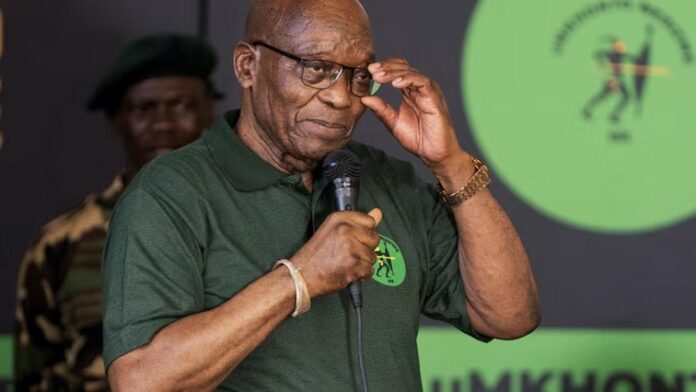The Umkhonto Wesizwe Party (MK Party) has been hit by a significant blow as its legal adviser, Advocate Mashudu Tshivhase, resigned shortly before the May 29 elections.
In a letter addressed to MK Party’s acting secretary-general, Sihle Ngubane, Tshivhase expressed his desire to continue practicing as an advocate and cited the need to remain unbiased and impartial in administering the law.
Consequently, he felt it necessary to avoid any potential conflict of interest, leading to his immediate resignation from the MK Party.
[ Constitutional Court Reserves Judgment On Zuma’s Eligibility For Parliament ]
Tshivhase’s resignation comes on the heels of the expulsion of party founder Jabulani Khumalo. The MK Party recently found itself in a legal battle against the Electoral Commission of South Africa (IEC) at the Constitutional Court.
The dispute centred around the eligibility of former President Jacob Zuma to be a candidate in the upcoming elections, despite his 15-month jail sentence for contempt of court in 2021. The IEC appealed the Electoral Court’s ruling, which granted Zuma’s candidacy.
During the proceedings, the Council for the Advancement of the South African Constitution (CASAC), Corruption Watch, and the Ahmed Kathrada Foundation made submissions as amici curiae (friends of the court).
However, MK Party argued that these submissions merely echoed the IEC’s arguments and did not bring anything new.
CASAC contended that a remission of sentence did not reduce the original sentence imposed by the court but only brought forward the date of release or completion of the sentence.
They also argued that the requirement to exhaust all available appeal processes before seeking remission was intended to ensure finality. On the other hand, the MK Party maintained that CASAC oversimplified the argument by dismissing the relevance of remission solely based on its “limited effect.”
The MK Party emphasized that remission was not comparable to a reprieve or pardon and served as a mechanism to facilitate the execution of sentences and the administration of prisons.
The IEC’s main question revolved around whether Zuma’s conviction and sentence of more than 12 months imprisonment rendered him ineligible to stand as a candidate for the National Assembly according to the constitution.
The IEC appealed the Electoral Court’s decision in the public interest and to fulfil its constitutional duty of managing elections. The commission argued that the Electoral Court made a fundamental error in determining that Zuma qualified to participate in the May 29 elections.
Catch up with the latest news from The Times Post on WhatsApp by following our channel. Click here to join.
Kindly follow @thetimespost on Instagram. On X (Twitter), follow @thetimespost2.















